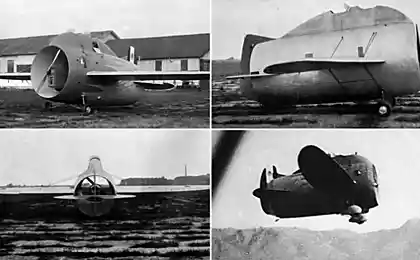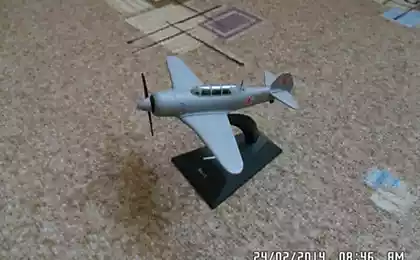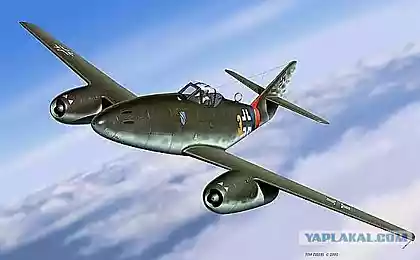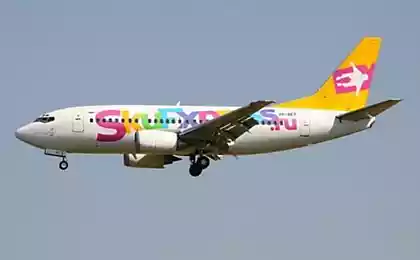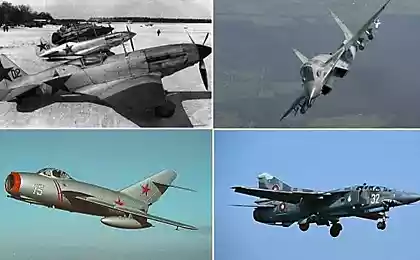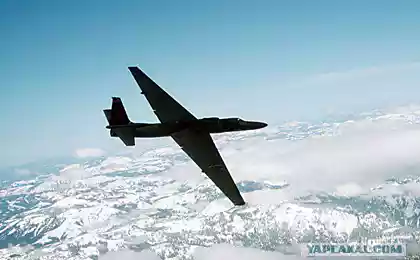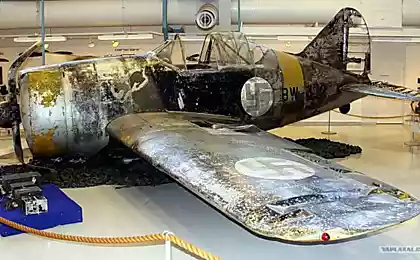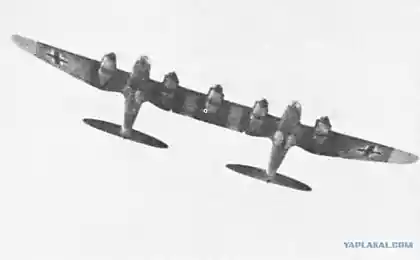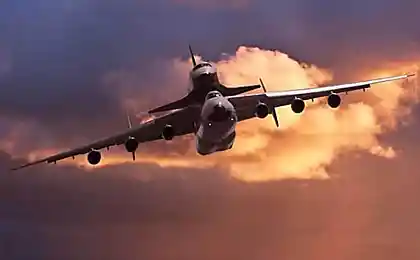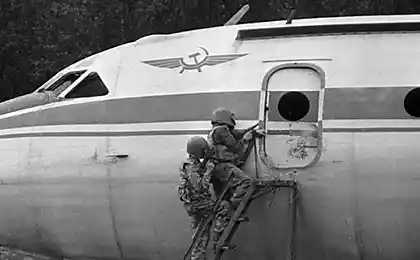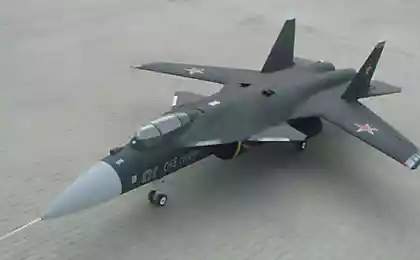558
The unique language of pilots
For the first time having been in the cockpit of an airplane, of course, I fell in love with the view, but beyond that, I was fascinated by the sounds. Then again, I never was a pilot. I was a passenger of the Boeing 747 of British Airways flying flight Tokyo — London. It was a working trip, I was a management consultant, accustomed to frequent flights, but still a big baby when it comes to anything associated with the aircraft.
I asked the stewardess if I could look into the cabin, as always asked before 11 September 2001. Soon I was on my way to the cockpit, the sharp end (in their terminology) to have a long conversation somewhere in the sky over Russia. Later, the pilots — one of which I subsequently flew, becoming his colleague on the same 747 — invited me back into the cockpit to watch the approach to Heathrow.
Fastened five-point belt to the seat behind the gray-haired captain, I was stunned by the view of the North sea and the mouth of the Thames and then the London, the sprawling perfection of miniature buildings, even more wonderful after so many hours over the forests and tundra of Siberia. When we declined, one flew over St Paul's Cathedral, bridges and parks, I couldn't help thinking that this is London, a modern city grew on the site of a much more ancient, and we arrive at once from Tokyo, descending straight from heaven.
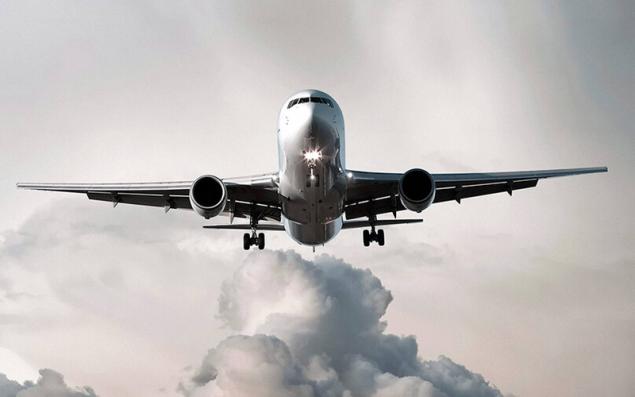
I fell in love with what I saw from the plane that day. But at least I was struck by the abrupt, monumental technical terms, I heard from expensive-looking noise-isolating headset, which I handed to the crew members.
The pilots were talking about "exchange rate of the beacons", "glissade", "reference speed plus five" (as I later learned, it was about the standard speed touch). Using barely understandable to me the terms, they were contacted by radio with taciturn guys with callsigns "Maastricht Control", "London Centre" and the awesomely sounding "Heathrow Director".
The plane itself began to speak out loud when we approached the land, declaring our height, and then, for no reason, requiring a clear staccato voice: "DECIDE" — DECIDE.
To solve that? I decided that to decide to become a pilot. So, after a few years since I first heard the language of heaven, I became a pilot, listening to a busy frequency Heathrow waiting for a pause in which I could intervene, requesting permission from the dispatcher to start the engines.
Thirteen years later I still love my work enough to write a book about it. And I still love the language of heaven.
I like that it is universal; you can't expect other from the sphere, a symbol and a major catalyst of globalization. I like that this language is so invisible, though, and used everywhere. When I fly as a passenger, this language is used in front, at the sharp end of the plane, while I do crossword puzzles or reviewing the "Studio 30". And while I'm sitting on the back patio with a Cup of coffee and a book, this language sweeps the radio wave in the cloudless blue sky above me, sounding like he sounds over Honolulu, Cairo and Ulan Bator, anywhere.
I love how different the language of the heavens from everyday English — he even has a name, aarki (although sometimes it is called much more mundane, Aviation English). But most of all I love how aarki manages with all his usual technical precision to capture the high romance of flight — the aspect of my work — how could I not love her, which is rare to find time in the cockpit.
A notable feature aarskog is the profound influence exerted on him seaworthy terms. Take the right and left side; aft and nose; deck; ship's log; the captain and his first mate; the frames, the hold/baggage compartment (Hold in English means how the hold, and the Luggage compartment of a passenger aircraft — approx. Newочем) and galley; rudder and rudder; cocurrent track, nodes as a measure of speed, even waves, but rather orographic mountain — wave perturbations of the air around the folds of the terrain that can cause turbulence. And, of course, the word Aeronautics.
Despite all its charms, this profession is devoid of a long tradition, and I like that the aircraft have borrowed a fair part of their terms (summer uniform) have a more rich tradition of community navigators. This is the legacy I found it necessary to reflect in the title of my book, "Ballooning: a Journey with a pilot."
I've always liked the word sailing — it conjures images of icy masts, nautical charts, pressed against the table with oil lamps and the novel "Moby dick" by Herman Melville, written in Western Massachusetts, about a mile from the house where I spent my childhood, which is so carefully describes and fills it with the Holiness of the language of the sea. The book should asiaticafilmmediale, I'm convinced editors; then I thought I invented the word until I found a poem with the same name, written and published by William Watson in the late 19th century for a number of years before the first flight of the Wright brothers.
The thought of the massive debt the language of heaven in front of the sea — a nice reflection, which I occupy myself flying at the controls of a 747 over the open ocean and looking at a lone ship sailing through the vast blue of the ocean below, or when we approach the Aero port located near a major seaport, such as Singapore, Vancouver, Boston and many other cities, we see cargo ships and tankers, and sometimes cruise ships waiting to anchor until we come down to the port.
Another feature aarskog strong resemblance to English. A huge jet allows us to cross borders of lands where they speak the same language with the same ease with which I turned the pages of the Atlas as a teenager. Imagine a plane flying from London to Bangkok. First, the pilots communicate with air traffic controllers in the UK, but after just a few minutes after takeoff, the British air traffic controllers transmit their Belgian or Dutch colleagues, who in turn, pass shift Czech, Hungarian, Romanian, Turkish, Iranian and so on.
During the flight, the pilots not only listen to dispatchers on the ground, but other pilots Thais returning home from Paris, Russian pilots, heading to the Maldives, the air found in almost any combination of port, destination, nationality of the ship and the nation crew members. It seems like the whole world is flying somewhere.
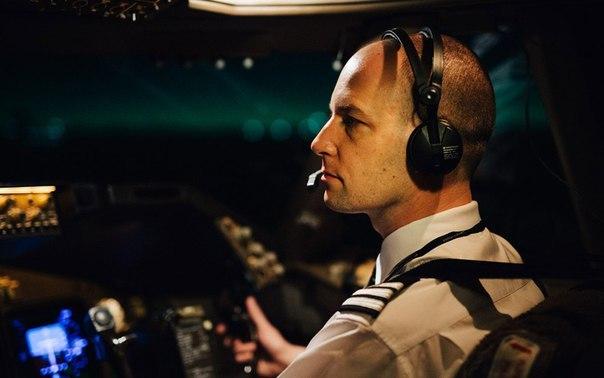
The author of the text is at the helm. Photo: Greg Funnel
It is difficult to imagine a system in need of stronger common language. And this language is English (or descended from him aarsi). When the Venezuelan pilot contacts the airport Manager in new York, or when the pilot of Brooklyn says a Manager in Caracas — they all speak English. It was very entertaining, first arriving in, say, Tokyo, to listen to the dialogue of the pilot-Japanese with a Japanese Manager, passing on badly warped English accent. Standardization and globalization are dictated by necessity, the influence of speed of travel.
There are exceptions — places where the managers can talk with the local pilots on common native language. This often happens, for example, in France, when the pilot, a Frenchman arrives in home airspace. Similar happens when much-traveled French pilots crossed the air border of the administrative space of Canada, nativeamerican. But every pilot of the international airlines are not only able to speak English, but does it constantly.
I like the word atmosphere, because we so rarely think about the fact that the air is the sphere, enveloping the smaller sphere, the world of earth and water. Similarly, the field of English language twist around the planet, as the air, but instead could be Babylonian control tower. Words and planes quickly pass through this area on land where people Wake up and speak Tagalog, Finnish or house, not thinking about the language that is spoken over them.
Just as English fills the airwaves, he fills the planes themselves. When I moved to Europe, I was surprised to discovered that even home appliances like stoves (even produced in the UK) rarely has a marking in the form of text, such as "oven" or "high (temperature)". Usually they are replaced by numbers or symbols — design solution to simplify the sale of the same goods in countries with different languages. But for me the symbols were incomprehensible (especially the weeping asterisk on the panel of my stoves), as agreed by many of my local friends.
Airplane manufacturers are also trying to sell them around the world, faced with an extreme degree of difficulty, familiar to the European manufacturers of household appliances in the design of the cockpit of ambiguity is far more dangerous than the design of the toaster. So the planes produced by Boeing and Airbus (the two leaders of the industry, to which I will return later), have captions in English or English abbreviations. This is true for all aircraft, whether they are produced in Renton (Washington), Toulouse (France), Tianjin (China) and regardless of whether the customer is Russian, Swedish or Chilean.
Every Boeing or Airbus sold together with a whole library of the technical instructions. They are all also written in English (this is especially noteworthy given the fact that the headquarters of Airbus is located in France). A rare airline to translate the instructions — it is an expensive undertaking, and, besides, endless, as they often are specified and supplemented. The high cost explains why many other companies use the original English instructions, even if for most of their pilots (if not all) English is not their native language.
This applies to checks, which the pilots are guided during key phases of flight. These cards are laminated sheets of paper, and in recent years, increasingly the screens that are part of the dashboard — simple, but very important element of aviation safety.
German or Japanese pilots will discuss your lunch or the weather behind German or Japanese, but when the time comes, for example, to check a security card "After takeoff" — they quickly and quietly switched to English (this is described in the "ecology of language practices in the global experience of air crew", a fascinating document, telling about how Japanese crews mixed Japanese and English in the cockpit).
It is also important to note that Boeing and Airbus use different dialects aarskog. For example, their aircraft is a system that serves as a kind of analogue of the cruise control (though it is not an exact analogy) — the autothrottle. On Boeing it's called autothrottle, and with Airbus — autothrust. Marking the fully raised position of the flaps — planes issued from the wing during takeoff and landing — up on Boeing, but Airbus zero. For pilots, students in the management of the new aircraft, the study of these differences in dialect can be one of the most difficult tasks.
Some passengers may be surprised by the fact that the planes themselves are able to speak aloud at certain stages of flight. Edwin Hutchins University of California, San Diego, lead author of the aforementioned study about the Japanese pilots who explained to me a pretty good reason why the aircraft says it is in English: "It is a question of certification. Voice alerts are part of the equipment installed on the aircraft."
This argument, according to him, applies to card-checks, are increasingly installed on modern aircraft. We often joke that on Board and not a light bulb to change, no filling out a stack of papers. Therefore, when the plane he says he speaks English, and often a male voice: "TRAFFIC, TRAFFIC" in order to draw our attention to another aircraft; or "ONE HUNDRED", is one of the alert altitude sounding during descent; "MONITOR RADAR DISPLAY" — in difficult weather conditions.
The most impressive nature monuments from the UNESCO list
The same Paris through the eyes of different people
My favorite alert is the same "DECIDE" the first time I heard the fateful flight from London to Tokyowhen I was a naive guest cockpit. This alert is pronounced in a female voice with a British accent (on the 747 that I fly), the decision altitude, when we must either establish visual contact with the band, or go to the next entry.
"SOLVE" should be machine — tool decision-making, which would come by the way in the conference rooms of large corporations or scientific institutions. Career counselors also would have appreciated a tool like this — it totally worked for me. published
Author: Greg Funnel
P. S. And remember, only by changing their consumption — together we change the world! ©
Source: vk.com/public80512191?w=page-80512191_51115415
I asked the stewardess if I could look into the cabin, as always asked before 11 September 2001. Soon I was on my way to the cockpit, the sharp end (in their terminology) to have a long conversation somewhere in the sky over Russia. Later, the pilots — one of which I subsequently flew, becoming his colleague on the same 747 — invited me back into the cockpit to watch the approach to Heathrow.
Fastened five-point belt to the seat behind the gray-haired captain, I was stunned by the view of the North sea and the mouth of the Thames and then the London, the sprawling perfection of miniature buildings, even more wonderful after so many hours over the forests and tundra of Siberia. When we declined, one flew over St Paul's Cathedral, bridges and parks, I couldn't help thinking that this is London, a modern city grew on the site of a much more ancient, and we arrive at once from Tokyo, descending straight from heaven.

I fell in love with what I saw from the plane that day. But at least I was struck by the abrupt, monumental technical terms, I heard from expensive-looking noise-isolating headset, which I handed to the crew members.
The pilots were talking about "exchange rate of the beacons", "glissade", "reference speed plus five" (as I later learned, it was about the standard speed touch). Using barely understandable to me the terms, they were contacted by radio with taciturn guys with callsigns "Maastricht Control", "London Centre" and the awesomely sounding "Heathrow Director".
The plane itself began to speak out loud when we approached the land, declaring our height, and then, for no reason, requiring a clear staccato voice: "DECIDE" — DECIDE.
To solve that? I decided that to decide to become a pilot. So, after a few years since I first heard the language of heaven, I became a pilot, listening to a busy frequency Heathrow waiting for a pause in which I could intervene, requesting permission from the dispatcher to start the engines.
Thirteen years later I still love my work enough to write a book about it. And I still love the language of heaven.
I like that it is universal; you can't expect other from the sphere, a symbol and a major catalyst of globalization. I like that this language is so invisible, though, and used everywhere. When I fly as a passenger, this language is used in front, at the sharp end of the plane, while I do crossword puzzles or reviewing the "Studio 30". And while I'm sitting on the back patio with a Cup of coffee and a book, this language sweeps the radio wave in the cloudless blue sky above me, sounding like he sounds over Honolulu, Cairo and Ulan Bator, anywhere.
I love how different the language of the heavens from everyday English — he even has a name, aarki (although sometimes it is called much more mundane, Aviation English). But most of all I love how aarki manages with all his usual technical precision to capture the high romance of flight — the aspect of my work — how could I not love her, which is rare to find time in the cockpit.
A notable feature aarskog is the profound influence exerted on him seaworthy terms. Take the right and left side; aft and nose; deck; ship's log; the captain and his first mate; the frames, the hold/baggage compartment (Hold in English means how the hold, and the Luggage compartment of a passenger aircraft — approx. Newочем) and galley; rudder and rudder; cocurrent track, nodes as a measure of speed, even waves, but rather orographic mountain — wave perturbations of the air around the folds of the terrain that can cause turbulence. And, of course, the word Aeronautics.
Despite all its charms, this profession is devoid of a long tradition, and I like that the aircraft have borrowed a fair part of their terms (summer uniform) have a more rich tradition of community navigators. This is the legacy I found it necessary to reflect in the title of my book, "Ballooning: a Journey with a pilot."
I've always liked the word sailing — it conjures images of icy masts, nautical charts, pressed against the table with oil lamps and the novel "Moby dick" by Herman Melville, written in Western Massachusetts, about a mile from the house where I spent my childhood, which is so carefully describes and fills it with the Holiness of the language of the sea. The book should asiaticafilmmediale, I'm convinced editors; then I thought I invented the word until I found a poem with the same name, written and published by William Watson in the late 19th century for a number of years before the first flight of the Wright brothers.
The thought of the massive debt the language of heaven in front of the sea — a nice reflection, which I occupy myself flying at the controls of a 747 over the open ocean and looking at a lone ship sailing through the vast blue of the ocean below, or when we approach the Aero port located near a major seaport, such as Singapore, Vancouver, Boston and many other cities, we see cargo ships and tankers, and sometimes cruise ships waiting to anchor until we come down to the port.
Another feature aarskog strong resemblance to English. A huge jet allows us to cross borders of lands where they speak the same language with the same ease with which I turned the pages of the Atlas as a teenager. Imagine a plane flying from London to Bangkok. First, the pilots communicate with air traffic controllers in the UK, but after just a few minutes after takeoff, the British air traffic controllers transmit their Belgian or Dutch colleagues, who in turn, pass shift Czech, Hungarian, Romanian, Turkish, Iranian and so on.
During the flight, the pilots not only listen to dispatchers on the ground, but other pilots Thais returning home from Paris, Russian pilots, heading to the Maldives, the air found in almost any combination of port, destination, nationality of the ship and the nation crew members. It seems like the whole world is flying somewhere.

The author of the text is at the helm. Photo: Greg Funnel
It is difficult to imagine a system in need of stronger common language. And this language is English (or descended from him aarsi). When the Venezuelan pilot contacts the airport Manager in new York, or when the pilot of Brooklyn says a Manager in Caracas — they all speak English. It was very entertaining, first arriving in, say, Tokyo, to listen to the dialogue of the pilot-Japanese with a Japanese Manager, passing on badly warped English accent. Standardization and globalization are dictated by necessity, the influence of speed of travel.
There are exceptions — places where the managers can talk with the local pilots on common native language. This often happens, for example, in France, when the pilot, a Frenchman arrives in home airspace. Similar happens when much-traveled French pilots crossed the air border of the administrative space of Canada, nativeamerican. But every pilot of the international airlines are not only able to speak English, but does it constantly.
I like the word atmosphere, because we so rarely think about the fact that the air is the sphere, enveloping the smaller sphere, the world of earth and water. Similarly, the field of English language twist around the planet, as the air, but instead could be Babylonian control tower. Words and planes quickly pass through this area on land where people Wake up and speak Tagalog, Finnish or house, not thinking about the language that is spoken over them.
Just as English fills the airwaves, he fills the planes themselves. When I moved to Europe, I was surprised to discovered that even home appliances like stoves (even produced in the UK) rarely has a marking in the form of text, such as "oven" or "high (temperature)". Usually they are replaced by numbers or symbols — design solution to simplify the sale of the same goods in countries with different languages. But for me the symbols were incomprehensible (especially the weeping asterisk on the panel of my stoves), as agreed by many of my local friends.
Airplane manufacturers are also trying to sell them around the world, faced with an extreme degree of difficulty, familiar to the European manufacturers of household appliances in the design of the cockpit of ambiguity is far more dangerous than the design of the toaster. So the planes produced by Boeing and Airbus (the two leaders of the industry, to which I will return later), have captions in English or English abbreviations. This is true for all aircraft, whether they are produced in Renton (Washington), Toulouse (France), Tianjin (China) and regardless of whether the customer is Russian, Swedish or Chilean.
Every Boeing or Airbus sold together with a whole library of the technical instructions. They are all also written in English (this is especially noteworthy given the fact that the headquarters of Airbus is located in France). A rare airline to translate the instructions — it is an expensive undertaking, and, besides, endless, as they often are specified and supplemented. The high cost explains why many other companies use the original English instructions, even if for most of their pilots (if not all) English is not their native language.
This applies to checks, which the pilots are guided during key phases of flight. These cards are laminated sheets of paper, and in recent years, increasingly the screens that are part of the dashboard — simple, but very important element of aviation safety.
German or Japanese pilots will discuss your lunch or the weather behind German or Japanese, but when the time comes, for example, to check a security card "After takeoff" — they quickly and quietly switched to English (this is described in the "ecology of language practices in the global experience of air crew", a fascinating document, telling about how Japanese crews mixed Japanese and English in the cockpit).
It is also important to note that Boeing and Airbus use different dialects aarskog. For example, their aircraft is a system that serves as a kind of analogue of the cruise control (though it is not an exact analogy) — the autothrottle. On Boeing it's called autothrottle, and with Airbus — autothrust. Marking the fully raised position of the flaps — planes issued from the wing during takeoff and landing — up on Boeing, but Airbus zero. For pilots, students in the management of the new aircraft, the study of these differences in dialect can be one of the most difficult tasks.
Some passengers may be surprised by the fact that the planes themselves are able to speak aloud at certain stages of flight. Edwin Hutchins University of California, San Diego, lead author of the aforementioned study about the Japanese pilots who explained to me a pretty good reason why the aircraft says it is in English: "It is a question of certification. Voice alerts are part of the equipment installed on the aircraft."
This argument, according to him, applies to card-checks, are increasingly installed on modern aircraft. We often joke that on Board and not a light bulb to change, no filling out a stack of papers. Therefore, when the plane he says he speaks English, and often a male voice: "TRAFFIC, TRAFFIC" in order to draw our attention to another aircraft; or "ONE HUNDRED", is one of the alert altitude sounding during descent; "MONITOR RADAR DISPLAY" — in difficult weather conditions.
The most impressive nature monuments from the UNESCO list
The same Paris through the eyes of different people
My favorite alert is the same "DECIDE" the first time I heard the fateful flight from London to Tokyowhen I was a naive guest cockpit. This alert is pronounced in a female voice with a British accent (on the 747 that I fly), the decision altitude, when we must either establish visual contact with the band, or go to the next entry.
"SOLVE" should be machine — tool decision-making, which would come by the way in the conference rooms of large corporations or scientific institutions. Career counselors also would have appreciated a tool like this — it totally worked for me. published
Author: Greg Funnel
P. S. And remember, only by changing their consumption — together we change the world! ©
Source: vk.com/public80512191?w=page-80512191_51115415
